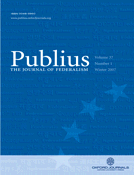-
Views
-
Cite
Cite
J. Tyler Dickovick, Municipalization as Central Government Strategy: Central-Regional–Local Politics in Peru, Brazil, and South Africa, Publius: The Journal of Federalism, Volume 37, Issue 1, Winter 2007, Pages 1–25, https://doi.org/10.1093/publius/pjl012
Close - Share Icon Share
Abstract
This article analyzes how central governments can use municipal decentralization to weaken intermediate levels of government using evidence from Peru, Brazil, and South Africa in the 1990s. Two principal questions are addressed. First, why did central governments opt for municipalization in these countries? Second, how did the municipalization processes proceed? In these cases, the strategic calculus behind municipalization is eminently political: central government incentives to counter the power of the intermediate level of government trigger these processes. Specific strategies to enhance municipal power vary from country to country and include revenue municipalization, expenditure municipalization, and juridical changes to strengthen localities. These three quite different cases show that central governments can make strategic and tactical decisions in intergovernmental relations to favor one level of subnational government to the detriment of another.




